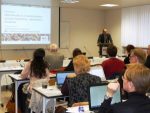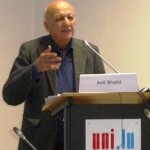Events 2014

Workshop – Interculturality as a Transdisciplinary Concept
November 5, 2014
On 5 November 2014, the Key Area organised an international workshop. Taking the topic ‘Interculturality as a Transdisciplinary Concept. Approaches – Applications – Desiderata’, this event was designed to cover various approaches to interculturality in the disciplines of linguistics, German studies, history, sociology and philosophy. The potential of interculturality concepts was also discussed and critically evaluated. Speakers were invited from a variety of countries and academic cultures:
Anil Bhatti (Jawaharlal Nehru University New Delhi)
Ähnlichkeit und Differenz in einer Migrationswelt. Aspekte von Kulturproduktion und Kulturtheorie heute
Mike Byram (Durham University)
Competence-based approach(es) to Interculturality in Education and Criticality
Johannes Meyer-Hamme (University of Paderborn)
Diversity of histories. Historical thinking skills in intercultural perspective
Fred Dervin (University of Helsinki)
Interculturality beyond culture: Does it make sense?
Manfred Weinberg (Charles University in Prague)
Interkulturalität als Projekt
‘Similarity’ and ‘Interculturality’ as Guiding Concepts

The concept of ‘similarity’ emerged as a key term during the workshop, introduced by Anil Bhatti (New Delhi) as a search term in the first lecture. Whilst ‘interculturality’ played no role for Bhatti’s concept of interdependence and overlapping, it was made the focus of the lecture given by Mike Byram (Durham), named as a specific skill within foreign language teaching. Johannes Meyer-Hamme (Paderborn) continued examining the question of mediation but from a historical-didactic perspective in his lecture. He began by referring to the existing research tradition in the topic area of ‘historical intercultural learning’, but also emphasised that more comprehensive investigations still represent a research desideratum. Fred Dervin (Helsinki) critically examined the concept of ‘interculturality’ in his lecture: it was described as polysemic, outdated and in constant danger of being identified with a closed cultural concept. Nevertheless, Dervin advocated retaining the concept of interculturality and developed an ideal type for ‘interculturalists’.
Re-examining the concept of ‘interculturality’
Manfred Weinberg (Prague) finally rounded off the conference with a re-examination of the concept of ‘interculturality’, and also opened new prospects for interculturality research: the concept of a ‘border’ was in his view too narrow for intercultural spatial concepts, meaning that the term ‘border’ should be replaced with the spatial model of the horizon. The horizon, which does not represent a space encircled by a border but rather a space which requires the occurrence of stable units and border relationships to be constantly newly discussed and clarified, enables investigation of unstable units, temporary borders, mixings and displacements.
Outlook: ‘Narratology of Interculturality’
The workshop saw differences in the definition and use of the concept of interculturality become manifest, together with remarkable overlaps: in addition to operating with an open cultural concept and the corresponding understanding of culture as a plurale tantum, ‘similarity’ and ‘interdependence’ emerged as key terms. Narrative readings of culture also again emerged, prompting Dieter Heimböckel to name the research field of ‘Narratology in Interculturality’ as a potential future prospect in his closing remarks.

